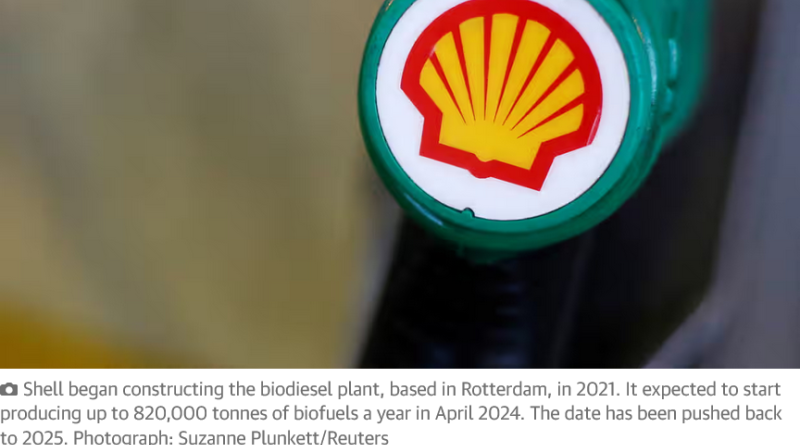Shell to pause construction of huge biodiesel plant in Rotterdam

Shell has paused the construction of one of Europe’s largest biofuel plants which was expected to convert waste into green jet fuel and biodiesel by the end of the decade.
The oil company said on Tuesday it would “temporarily pause” work on one of its biggest energy transition projects to address the technical difficulties that have delayed its progress so far.
Shell began constructing the plant, based in Rotterdam in the Netherlands, in 2021, and had initially expected to start producing up to 820,000 tonnes of biofuels a year in April, before this was pushed back to 2025.
About half of the plant’s biofuels were to be used for sustainable aviation fuel (SAF) made from waste cooking oil and animal fat. The fuel is seen by some as crucial if airlines are to cut their carbon emissions in line with global climate targets.
The nascent industry has also attracted criticism from those who claim that SAF is not a realistic replacement for paraffin-based aviation fuels within the timescale needed to prevent rising carbon emissions from creating a climate catastrophe.
“We’re taking the tough decision now to temporarily pause on-site construction,” a Shell spokesperson said. “This gives us the opportunity to take stock, complete engineering, optimise project sequencing and in doing so maintain capital discipline.”
The spokesperson added: “Low-carbon fuels form a key part of Shell’s ambitions to provide affordable and sustainable products to our customers.”
The aviation industry accounts for 3% of the world’s carbon emissions, and is seen as one of the most difficult forms of transportation to decarbonise.
The decision to pause the work deals another blow to Shell’s biofuels plans after the company cancelled an SAF project at Singapore’s Bukom Island in March last year.
Shell was considering investment in a plant that could produce 550,000 tonnes of SAF a year to supply major Asian hubs such as Hong Kong International airport and Singapore’s Changi.
The blow to Shell’s green aviation plans has come after the company signalled a scaling back of its green growth ambitions by reducing the number of staff working on low-carbon solutions by at least 200 roles, while a further 130 positions will be placed under review.
The decision is expected to affect Shell’s plans for offshore wind development and sharply scale back its ambitions to fuel hydrogen passenger vehicles. Shell was an early adopter of hydrogen, which has fallen out of favour as electric vehicles become more popular.
Instead, Shell’s chief executive, Wael Sawan, is planning to shift its focus towards high-profit oil projects and expanding its gas business to exploit higher global oil and gas prices after Russia’s invasion of Ukraine.
The rise in global energy market prices has prompted executives across the oil and gas industry to review green investment plans and climate targets.
BP confirmed last week it would halt investment in new offshore wind projects, and place a hiring freeze for the new business division, in an apparent attempt to placate investors who are unhappy with the greener direction set by its ousted boss Bernard Looney.





